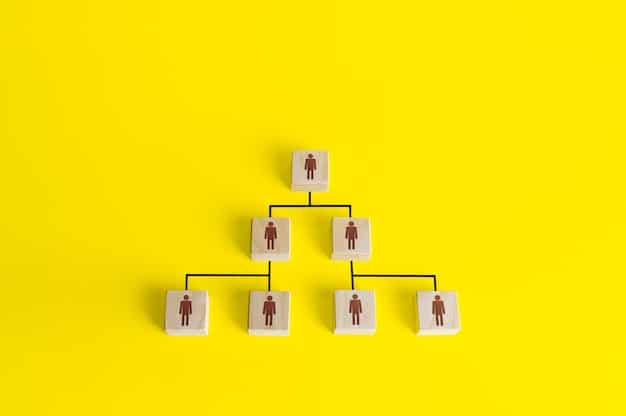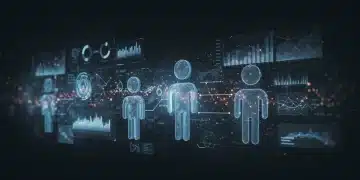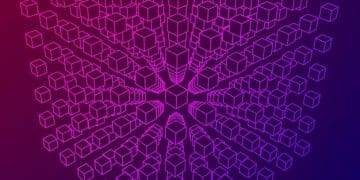Will DAOs Overtake Traditional Companies in the US by 2030?

Decentralized Autonomous Organizations (DAOs) may not entirely replace traditional companies in the US by 2030, but they are poised to significantly disrupt and reshape aspects of traditional business structures through innovative governance and community-driven models.
The question of whether DAOs will replace traditional companies in the US by 2030 sparks intense debate. While a complete takeover seems unlikely, DAOs are rapidly evolving and presenting a compelling alternative to conventional corporate structures.
Understanding DAOs: A New Paradigm
To assess the potential impact of DAOs, it’s crucial to first understand what they are. DAOs represent a fundamentally different approach to organization, governance, and value creation.
What is a DAO?
A DAO, or Decentralized Autonomous Organization, is an internet-native entity with membership, which is tokenized, and an executive function of the organization is coded into immutable computer programs called smart contracts. These smart contracts automate decisions that involve money or data, and give members of a DAO a far higher degree of control and responsibility relative to a traditional organization. DAOs provide greater transparency, because all smart contracts and transaction data are auditable on a public blockchain.
- Decentralized: Decision-making power is distributed among token holders rather than concentrated in a few executives.
- Autonomous: Rules and processes are encoded in smart contracts, automating many operational functions.
- Transparent: All transactions and governance proposals are publicly auditable on the blockchain.
DAOs are not limited by geography and can attract a diverse range of contributors from around the world, fostering innovation and creativity. They are designed to operate transparently, with all transactions and governance decisions recorded on the blockchain.
Traditional Companies: An Overview
Traditional companies operate under a hierarchical structure with centralized decision-making. Examining their key characteristics provides a basis for comparison with DAOs.
Key Features of Traditional Companies
Traditional companies, like corporations and LLCs, have well-defined legal structures and established operational models. These structures are defined by management hierarchies and legal jurisdictions.
- Hierarchical Structure: Decision-making flows from the top down, with executives and managers holding the most power.
- Centralized Control: A small group of individuals typically controls the company’s strategic direction and operations.
- Legal Compliance: Traditional companies must comply with a wide range of regulations and legal requirements, which can be complex and costly.
The traditional corporate model has been refined over centuries to facilitate large-scale economic activity. However, it also faces challenges related to bureaucracy, lack of transparency, and misalignment of incentives.

The Rise of DAOs: Disruption or Complement?
DAOs offer a compelling alternative to traditional companies, but are they truly disruptive? The answer lies in how DAOs address the shortcomings of traditional models and where they excel.
Advantages of DAOs
DAOs provide several advantages over traditional companies, including increased transparency, greater participation in decision-making, and more aligned incentives.
- Enhanced Transparency: Blockchain-based governance ensures that all actions are visible and verifiable.
- Increased Participation: Token holders can propose and vote on important decisions, fostering a sense of ownership.
- Aligned Incentives: Tokenomics can be designed to reward contributors and stakeholders, promoting long-term commitment and engagement.
For example, Aragon, an ecosystem for building DAOs, already has over 2,000 DAOs built on its platform, including decentralized finance (DeFi) projects, NFT communities, and investment clubs, all working to build a more open and decentralized world.
Challenges and Limitations of DAOs
Despite their potential advantages, DAOs face significant challenges that could hinder their widespread adoption in the US by 2030.

Governance Issues
Effective decision-making can be challenging in DAOs, especially with large numbers of token holders. Coordination problems and slow decision-making processes can impede progress.
One of the principal challenges of DAOs is coordination between and alignment of mission priorities among members. In some cases, a minority with controlling levels of tokens can attempt to direct the DAO for their own personal enrichment, which, if undetected, can threaten a project and set it back considerably.
Regulatory Uncertainty
The legal status of DAOs remains unclear in many jurisdictions, including the US. This uncertainty creates risks for DAO participants and makes it difficult for DAOs to operate legally.
In March 2024, the state of Utah passed legislation recognizing DAOs as limited liability companies (LLCs) that provide legal certainty for DAOs and their members, and the state of Wyoming has similar legislation that has been in effect since early 2021. Many in the Web3 and DAO communities feel more legal scaffolding must be established before DAOs can operate with the ease, protection, and compliance confidence that traditional companies enjoy today.
Will DAOs Replace Traditional Companies by 2030?
While DAOs hold immense promise, a complete replacement of traditional companies in the US by 2030 seems unlikely. However, DAOs are poised to significantly influence and reshape aspects of traditional business structures.
Hybrid Models
One likely scenario is the emergence of hybrid models that combine the best of both worlds. Traditional companies may adopt DAO-like governance mechanisms to increase transparency, engage stakeholders, and foster innovation.
For example, a traditional company may launch a DAO to govern a specific project or product line, allowing customers and community members to participate in decision-making. This approach can help companies build stronger relationships with their stakeholders and tap into new sources of ideas and innovation.
The Future of Work and Organizations
The debate over DAOs versus traditional companies raises fundamental questions about the future of work, organizations, and governance. As technology continues to evolve, new organizational models will emerge, blurring the lines between traditional and decentralized structures.
Implications for Employment
DAOs could disrupt traditional employment models by enabling more flexible, project-based work. Individuals may contribute to multiple DAOs simultaneously, earning tokens and building a diversified portfolio of skills and experiences.
The implications of this trend are significant. Workers may have greater autonomy but less job security. Employers may find it easier to access talent but harder to retain it. New forms of social safety nets and worker protections may be needed to address these challenges.
| Key Aspect | Brief Description |
|---|---|
| 💡 DAOs | Decentralized, autonomous organizations governed by code. |
| 🏢 Traditional Companies | Hierarchical with centralized decision-making. |
| ⚖️ Challenges | Governance, regulatory uncertainty, and scalability. |
| 🔮 Future | Hybrid models and new organizational paradigms. |
▼
A DAO is an internet-native entity with membership, which is tokenized, and its executive functions are coded into smart contracts. These contracts automate processes and give members more control.
▼
DAOs are transparent and decentralized compared to traditional companies, which have centralized power and hierarchical structures. DAOs rely on smart contracts for governance.
▼
DAOs give their members a far higher degree of control and responsibility as compared to traditional organizations. In addition DAOs provide greater transparency and tokenized membership.
▼
DAOs face challenges like regulatory uncertainty, governance complexities, and scalability issues. Legal frameworks are still evolving, making compliance difficult.
▼
The future likely involves hybrid models where traditional companies adopt DAO-like structures. DAOs may reshape employment by enabling project-based work. The legal landscape is also expected to evolve.
Conclusion
In conclusion, while DAOs are unlikely to completely replace traditional companies in the US by 2030, they are poised to significantly disrupt and influence aspects of organizational governance and business models. The rise of hybrid models and the evolution of legal frameworks will play a crucial role in shaping the future of work and organizations.





